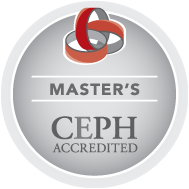Master of Public Health

Our MPH Program was founded in 1970 to prepare community health education practitioners
and has been continuously accredited by the Council on Education for Public Health
(CEPH) since 1974.
San Jose State University offers a MPH degree with a specialization in Community Health
Education in two formats:
- On Campus (Regular Session)
- Online (Special Session through Professional and Global Engagement. Formally the College of Professional and Global Education, "CPGE").
The MPH degree on Campus offers students the flexibility to complete their degree in 2 years or more, depending on personal circumstances. And the Online option is offered through Special Session and is a fast-paced, 24-month program of study. Admissions requirements are listed here.
The SJSU MPH Program is well-known for its practice-oriented, community-based training.
The program's essential mission is:
To provide professional education that prepares both students and graduates with knowledge, conceptual frameworks, health education and public health competencies, in order to develop programs, build community capacity, advocate policy for health equity and contribute to evidence-based public health practice.
Our ultimate goal is public health and social justice through planned, organized, and empowering community efforts.
MPH Information Sessions
If you are interested in applying to the MPH Program, we encourage you to attend one of our MPH Information Sessions: List of current sessions
Our 60 minute session is a program presentation and open Q&A. This is a great opportunity to ask program questions and to meet our faculty members. Also, you are welcome to attend as many sessions as you want!
Additional Information
For admission requirements, deadlines and how to apply, please visit our Admissions page
Register to get more information on the MPH Online Format from Professional and Global Engagement, formally the College of Professional and Global Education (CPGE).
Feel free to follow us on Facebook and Instagram
If you have additional questions, please contact the MPH Program at master-public-health@sjsu.edu or via phone, 408-924-2980